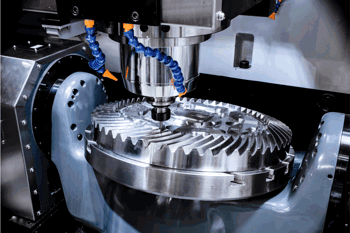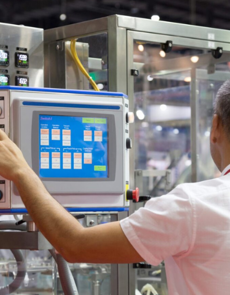What is Manufacturing ERP Software?
Manufacturing ERP software joins the dots across your manufacturing business, streamlines key processes and give you complete visibility and control over all aspects of production and beyond.
This guide explores the benefits and challenges of investing in enterprise resource planning software, before outlining the main features that set Access’ Manufacturing ERP software apart from the rest of the market.
What is Manufacturing ERP Software?
ERP solutions for manufacturing are specialised systems designed to manage the main elements of enterprise resource planning specifically for manufacturers. This includes production planning, material requirements planning (MRP), CRM, HR, quality control, reporting and analytics.
ERP software for manufacturing provides an ideal way to unite separate functions and data streams into one system, enabling your entire organisation to work from a single source of truth. An ERP platform is effectively a suite of essential tools that allows manufacturers to plan, execute and track their operations.
The overall goal of manufacturing ERP software is to achieve maximum efficiency across all aspects of your business. By automating tasks and providing real-time visibility into key metrics – such as production output, inventory levels and resource utilisation – manufacturers can streamline day-to-day workflows and eliminate barriers to productivity. This leads to reduced lead times, increased output and lower production costs.
The data insights gained from ERP solutions can be used to inform strategic decisions and respond quickly to emerging trends. This helps manufacturers stay agile, maintain a 360-degree view of their operations at all times and make decisions based on data, not guesswork.
Why is ERP Software Used in Manufacturing?
Managing a successful manufacturing operation involves many moving parts. Inefficiencies can easily arise when processes are managed manually, or in separate silos – and that often leads to wasted time and resources, quality issues, and missed delivery dates for example. Having a centralised system at the heart of operations is a major benefit for business leaders as it leads to a joined up approach between teams – such as production and sales working together to ensure accurate pricing is in place.
Production scheduling alone requires intricate coordination of resources, labour and machinery to meet demand. Errors in inventory management can result in overstocking or understocking of materials, which in turn causes disruption to operations, delays, missed deadlines and unhappy customers.
According to a study by Aberdeen Group, companies using an effective ERP software reported a 20% reduction in manufacturing cycle time and a 20% increase in on-time delivery. The study also found that ERP software enables better coordination across departments, fostering collaboration and improving overall performance.
Achieving and maintaining compliance with evolving regulations adds another layer of complexity. Failure to meet standards inevitably leads to legal consequences, costly fines and significant reputational damage. ERP systems make it far easier to collate and store data from different manufacturing processes, and demonstrate a clear audit trail.

7 Benefits of ERP Software for Manufacturing Companies
1. Improved production planning and scheduling
ERP solutions for manufacturing are vital to optimise production schedules, allocate resources efficiently and orchestrate more efficient workflows. This enables manufacturers to increase capacity, cut lead times and achieve a faster time-to-market for key products.
Explore production planning and scheduling software >
2. Enhanced stock management and control
ERP software enables real-time tracking of inventory levels and automated replenishment processes, which helps free up time for managers to focus on other areas of the business and minimises the risk of stock issues.
3. Streamlined supply chain management
ERP solutions for manufacturers enable better integration between suppliers, distributors and logistics partners, creating a seamless information flow throughout the entire supply chain.
4. Increased quality control and compliance
With quality management integrated into ERP systems, manufacturers put themselves in a stronger position to enforce standards, track product specifications and manage compliance requirements. Providing the same high-quality product again and again helps maintain customer satisfaction and encourages repeat business.
5. Improved communication and collaboration across departments
ERP systems allow for greater cross-functional collaboration by centralising data and processes, enabling departments like production, sales and finance to work from shared real-time data and align themselves towards common goals.
6. Better data visibility and informed decision-making
Manufacturers benefit from comprehensive, real-time insights into all aspects of their operations. This information can be shared with stakeholders within the wider business, feeding directly into strategic planning and proactive problem-solving.
7. Reduced costs and improved profitability
Aiming to optimise processes while minimising waste wherever possible is an effective way to cut operational costs and improve profitability. This is a core ethos behind the ‘lean manufacturing’ approach.

Standard ERP vs. Access Manufacturing ERP Software Solutions
Many standard ERP platforms come as a one-size-fits-all solution that can’t always be tailored to meet specific business needs.
While basic systems may offer a lower upfront cost, they often skimp on key aspects of functionality, integration, ongoing support and scalability, all of which are vital to sustain high performance with minimal downtime over the long term. Access’ Manufacturing ERP software solution is a package of integrated systems that underpin your business. Two-way data flows allow real-time information to be automatically updated and synchronised across all your Access software, ensuring teams and stakeholders always stay on the same page.
Each software solution within the Access ecosystem works as a standalone program, or as part of an integrated solution that allows businesses to plug in various functionalities as and when needed.
Unlike other providers, Access also offers sector-specific ERP solutions designed with industry needs in mind, including a number of manufacturing sectors: pharmaceuticals, aerospace, automotive, metal fabrication, precision and specialised engineering, food and beverage and many more.
The Access Manufacturing ERP system has been created to meet core challenges around production scheduling, bill of materials management, quality control and many more elements fundamental to manufacturing operations.
Manufacturing ERP Software Vs Standard ERP Software
Which ERP Software is Best For Manufacturing?
There’s no shortage of choice on the market when it comes to selecting the right ERP software for your manufacturing business.
We always recommend doing your research and comparing different vendors to find the best fit for your main criteria.
Along with establishing your main system requirements, a good starting point is to clarify your company size best fit, budget constraints and future scalability requirements. For instance, a small manufacturing firm may prioritise affordability over industry-specific needs, while a mid-market or large enterprise might seek advanced functionalities and robust scalability options to support ongoing growth. This is a big help when it comes to ruling out providers that don’t meet your basic needs and system profile.
Easy integration with your existing tech stack is a major plus that will save a lot of time and headaches down the line, especially for your IT team. Vendor reputation and customer training and support quality should also weigh heavily in your decision, as reliable support can make a huge difference in the success of your ERP implementation.
Access Manufacturing ERP Software
Access’ Manufacturing ERP software solution suite is an end-to-end solution created to underpin every aspect of manufacturing businesses.
Rather than offering everything in a one-size-fits-all package, your business has the flexibility to pick the functionalities it requires, and you can add new modules as your business evolves and grows.
Explore more MRP resources and guides
MRP FAQs
what is an erp system in manufacturing?
An ERP (Enterprise Resource Planning) system in manufacturing is a comprehensive software solution designed to streamline and integrate various business processes within a manufacturing company. It enables organisations to efficiently manage key aspects such as production planning, inventory management, procurement, supply chain operations, human resources, and financial management in a cohesive manner. By centralising data and processes, an ERP system provides real-time visibility into operations, enhances decision-making, optimizes resource utilisation, and facilitates better collaboration across departments. Ultimately, it helps manufacturers achieve greater efficiency, productivity, and competitiveness in today's dynamic market landscape.




